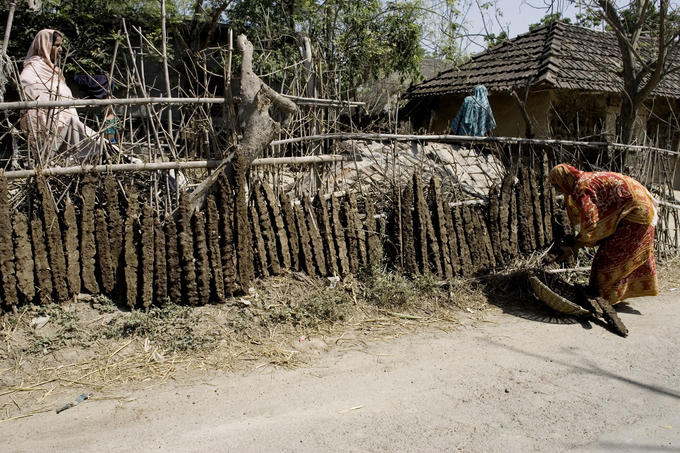October 10, 2025 | 14:16 GMT +7
October 10, 2025 | 14:16 GMT +7
Hotline: 0913.378.918
October 10, 2025 | 14:16 GMT +7
Hotline: 0913.378.918

A villager making biofuel from cow manure which dries in the sun in Prosadapur Village in the Gomostapur District, Bangladesh.
“We must use existing biological resources more efficiently, and waste less, instead of relying on finite fossil-based resources”, the Director of the Food and Agriculture Organization of the United Nations (FAO), QU Dongyu, told a high-level event held at the UN General Assembly to commemorate the first-ever International Day of Zero Waste.
In a video message, Qu explained that as the world population is predicted to grow close to 10 billion people by 2050, there is an immense challenge to meet the rapidly growing global demand for food and non-food agricultural products—projected to increase by up to 56 per cent by 2050.
“To meet this extra demand for agricultural inputs, including food, fibre, fuel and fodder, in an equitable and sustainable way… We must produce and consume in a more sustainable and healthier manner, with fewer inputs”, Qu underscored, adding that a circular and sustainable economy offers systemic solutions to address these challenges.
The Director-General highlighted that bioeconomy is a current FAO strategic priority to reduce waste and pollution, as it values and promotes responsible production and consumption of renewable natural resources, contributing to climate action, biodiversity conservation and ecosystems restoration.
“For example, waste and residues along agrifood systems can be turned into beneficial products such as biomaterials, biochemicals, biopharmaceuticals, and bioenergy. In the bioeconomy, there is no such thing as waste!”, Qu emphasized.
The current challenge of waste in agrifood systems
FAO estimates that more than 13 per cent of global food production is lost between the production and wholesale stages of the supply chain. Furthermore, global data indicates that an additional 17 per cent is wasted at the retail, food service, and consumer stages. Food quality is also compromised throughout the entire supply chain.
These losses occur while over 800 million people are undernourished and almost 3.1 billion cannot afford a healthy diet.
Moreover, food loss and waste contribute to 8-10% of global greenhouse gas emissions.
The FAO chief warned the 193 members of the UN General Assembly that wasting food and non-food agricultural products, as well as inputs like plastics, puts unnecessary pressure on the environment.
“It essentially means that we have wasted land and water resources, we have created pollution and we have emitted greenhouse gases with no purpose!”, he underlined.
Qu urged world leaders to identify the hotspots where losses and waste occur and to urgently address the inefficiencies and inequalities in global agrifood systems to make them more efficient, more inclusive, more resilient and more sustainable.
“Reducing losses and waste will not only contribute to our environment, but increase the availability of fruits and vegetables, and improve access to healthy diets”, he emphasized.
About the International Day of Zero Waste
At its seventy-seventh session on 14 December 2022, the United Nations General Assembly passed a resolution proposed by Türkiye and supported by 105 countries declaring that 30 March would be celebrated each year as the International Day of Zero Waste.
The observance, coordinated by the UN Environment Programme and UN Habitat, aims to promote sustainable consumption and production patterns and raise awareness about how zero-waste initiatives contribute to the advancement of the 2030 Agenda for Sustainable Development.
During the high-level event to celebrate the first “Zero Waste Day”, called by the President of the UN General Assembly, Member States and stakeholders exchanged experiences and success stories in solid waste management, including zero-waste initiatives.
The event had the participation of António Guterres, Secretary-General of the United Nations; Emine Erdoğan, First Lady of the Republic of Türkiye; Maimunah Mohd Sharif, Executive Director of UN-Habitat; and Ligia Noronha UN Assistant Secretary-General and Head of UNEP New York Office.
Guterres announced the establishment of an Advisory Board of Eminent Persons on Zero Waste to be led by Mohd Sharif and Jose Manuel Moller, CEO and Founder of the Chilean social enterprise Algramo.
FAO, as the UN lead technical agency for food and agriculture, is committed to working together with all partners to achieve the goal of zero waste through the transformation of global agrifood systems, for better production, better nutrition, a better environment and a better life for all, leaving no one behind.
The UN Food Systems Summit Stocktaking Moment, to be held at FAO headquarters in Rome in July this year, will be an important opportunity for countries to share, exchange, and promote early signs of transformations in their agrifood sector.
(FAO.org)

(VAN) The people who are most vulnerable to the hard-to-breathe air that comes with climate change may inadvertently be adding to the problem, new research finds.

(VAN) Director-General QU Dongyu announces series of initiatives following global livestock conference.

(VAN) China’s freeze on U.S. soybean purchases hits a key GOP constituency in the run-up to 2026 midterm elections.

(VAN) President Xi Jinping's festive greetings ahead of the eighth Chinese Farmers' Harvest Festival, which fell on Tuesday this year, were a clear signal that China regards food security as a core strategic issue.

(VAN) BBNJ Agreement will enter into force in January.

(VAN) Demonstrations have been planned around the world this week ahead of the United Nations General Assembly and New York Climate Week.

(VAN) After years of intense deliberation, the European Commission has finally given its nod to the Mercosur and Mexico agreement.